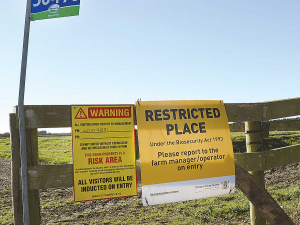DairyNZ Calls for Changes to Government’s Proposed Resource Management Act Reform
DairyNZ says the Government’s proposed Resource Management Act reform needs further work to ensure it delivers on its intent.
 The Mycoplasma bovis eradication programme is introducing new measures to target the pocket of confirmed pocket of infection.
The Mycoplasma bovis eradication programme is introducing new measures to target the pocket of confirmed pocket of infection.
The Mycoplasma bovis (M. bovis) eradication programme will target the sole pocket of confirmed infection with depopulation starting on a Mid-Canterbury feedlot and strict new biosecurity measures for the surrounding area.
Programme director Simon Andrew says the nationwide testing programme proves the M. bovis infection is isolated to a small area in Mid-Canterbury, where there are infected properties including the feedlot.
“We are working hard to investigate the exact transmission route, but at present that remains unclear,” Andrew says.
“Without a precise understanding of why this is happening, we need to take a different approach to protect cattle and farmers in the area.”
He says the eradication programme acknowledges the role local farmers play in helping to continue to better understand the situation.
Andrew says that to bolster this understanding, the programme will bring in extra technical advice.
“Although we are at the tail-end of this outbreak, it is possible we may find other infected properties in other parts of the country in the future and so we must remain vigilant and maintain our nationwide surveillance programme.
“We’ve come a long way from the height of the programme when there was a peak of 40 confirmed properties across the country to the small number of farms now and farmers have made huge sacrifices. We are committed to hunting down the last remaining infection. There’s been 275 confirmed properties to date out of 30,000-plus farms in New Zealand.”
Andrew says the M. bovis Programme, with DairyNZ and Beef + Lamb New Zealand (B+LNZ) will:
“The CAN steps up the already tight controls in the area as we think it’s important to take all possible steps to ensure this pocket of infection is contained and the progressive depopulation of the feedlot successful,” says Andrew.
He says that, as part of the CAN, after the depopulation of the high-risk area there will be a standdown period of two to three months to allow the properties to be cleaned and disinfected.
Programme partners, DairyNZ and B+LNZ, will work closely with impacted farmers in the area and compensation will be provided where required.
“We know the CAN will be extremely challenging and disruptive for a small number of farmers in the area and we will support them through this process,” says Andrew.
“Since the start of the programme, M. bovis has predominantly spread by animal movements and we ask farmers to continue keeping their NAIT records up-to-date to protect themselves and others.
“It’s easy to get complacent, especially with low numbers across the country, but now is the time where we must be more cautious than ever and that’s why we are taking these prudent steps.”
Andrew says the programme’s bulk milk test programme is going well and August 2022 is on track to be the first August since 2018 with no confirmed infection via bulk tank milk surveillance.
"While this is positive, it doesn't mean the job is done. It is likely that we’ll find more confirmed infection before we declare eradication successful. When we find any infection, we will deal with it.”
Budou are being picked now in Bridge Pā, the most intense and exciting time of the year for the Greencollar team – and the harvest of the finest eating grapes is weeks earlier than expected.
The Real Estate Institute of New Zealand (REINZ) has released its latest rural property report, providing a detailed view of New Zealand’s rural real estate market for the 12 months ending December 2025.
Rural retailer Farmlands has released it's latest round of half-year results, labeling it as evidence that its five-year strategy is delivering on financial performance and better value for members.
OPINION: "We are back to where we were a year ago," according to a leading banking analyst in the UK, referring to US president Donald Trump's latest imposition of a global 10% tariff on all exports into the US.
DairyNZ says the Government’s proposed Resource Management Act reform needs further work to ensure it delivers on its intent.
Overseas Trade Minister Todd McClay says he's working constructively with the Labour Party in the hope they will endorse the free trade agreement (FTA) with India when the agreement comes before Parliament for ratification.

OPINION: A mate of yours truly reckons rural Manawatu families are the latest to suffer under what he calls the…
OPINION: If old Winston Peters thinks building trade relations with new nations, such as India, isn't a necessary investment in…